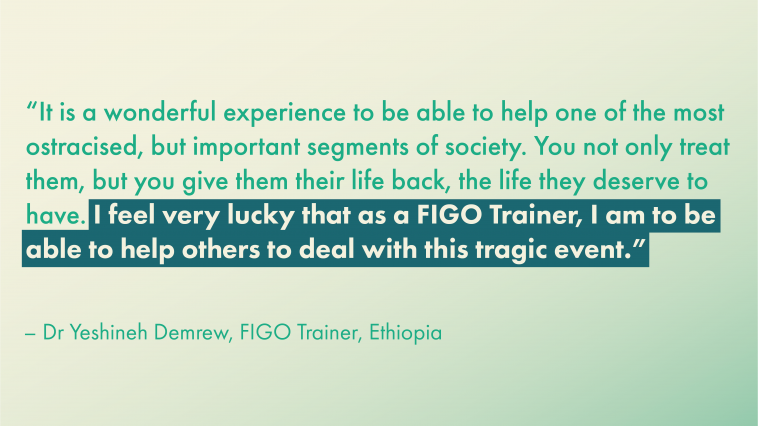Hearing from a FIGO fistula surgery trainer, Dr Yeshineh Demrew

Obstetric fistula is a neglected public health and human rights issue. A devastating childbirth injury that leaves women permanently incontinent unless they receive treatment by a trained, competent fistula surgeon.
The FIGO Fistula Surgery Training Initiative is a globally recognised, pioneering programme training fistula surgeons and care teams in countries where fistula occurs. Our 64 trainee surgeons – ‘FIGO Fellows’ – provide life-transforming care in some of the world’s most underserved regions and are working hard to close the fistula treatment gap.
This month, we spoke to Dr Yeshineh Demrew from Hamlin Fistula Ethiopia (a FIGO Fistula Training Centre) about his experience as a fistula surgeon and a FIGO Trainer.
My experience becoming a fistula surgeon and FIGO Trainer
My involvement in fistula related activities started more than 20 years ago, when I was assigned in one of the remotest areas in the western part of the country. Apart from being responsible for managing labouring mothers with different life-threatening problems, I was tasked with identifying and preparing mothers with obstetric fistula for a surgical campaign, carried out by a team from Addis Ababa Fistula hospital.
This gave me an opportunity to observe what these great surgeons and their assistants, some of them fistula survivors, were doing. I was able to assist in some of the surgeries, and later to repair selected cases by myself. Later on, when the fifth Hamlin treatment centre was opened, I was given the chance to work as a part-time surgeon. I received additional training and went on to work there for three years. Currently, I am working in the Addis Ababa Fistula Treatment Centre.
I was fortunate to work with Dr Catherine Hamlin, as we call her “Emaye”, the Amharic version of ‘mam’. She was a great physician and a great personality, a person whose entire life was focused on helping patients. She did not only build a fistula treatment centre, but also an institution which makes everyone feel like they are at home. Once you start working there, you feel like you are a member of a family trying to help other members of the same family.
After learning from great fistula surgeons, it is a wonderful experience to be able to help one of the most ostracised, but important segments of society. You not only treat them, but you give them their life back, the life they deserve to have. I know what it is like to be confronted with a woman leaking urine, stool or both and to not be able to help because you do not have enough experience. I feel very lucky that as a FIGO Trainer, I am able to help others deal with this tragic event.
Changing lives: an impactful patient story
For a health professional who is engaged in fistula-related activities, a day hardly passes without encountering a patient with a heart-breaking story. Although each patient has her own version, they all share a common tragedy. They all passed through a difficult and prolonged labour with near death experience and nearly all of them ended in a stillbirth after their suffering.
A particularly impactful moment for me was to see a patient crying at the end of a successful treatment. This was a 67-year-old patient who came from a place close to Addis Ababa – only 150 kilometres away. She had been living with urinary incontinence for 30 years following her second pregnancy. She went through a three-day labour resulting in a stillbirth and the development of an obstetric fistula. She was divorced, isolated from her loved ones and had been living in a monastery ever since. There, she prayed daily to be continent enough to see her loved ones, especially her first-born son, whom she had left with her ex-husband.
While in the monastery she made a friend, a woman who was previously treated for a similar problem. Suspicious due to the disagreeable odour, her new friend asked her whether she has a urinary incontinence. She told her tragic story to her new friend who informed her that there was a treatment for her problem and took her to the nearby health centre. The health centre brought the patient to our treatment centre. The mid-vaginal fistula, the reason for all her problems, was treated successfully. Before her discharge, when asked about how she was feeling, she said “I was nothing but a woman who was not able to control her urine, I smelled like urine, was isolated from the world, praying to be dry for one day and die the next morning. Now I am dry, I want to live and see my son for as long as possible. I hope God will let me live longer”.
The role of the FIGO Fistula Surgery Training Initiative in the global quest to end fistula
It is a well-known fact that in countries affected by obstetric fistula, there is a mismatch between the number of cases and the number of physicians with the capacity to effectively treat this problem. Physicians sadly see these patients, but most are unable to do anything. The FIGO Fistula Surgery Training Initiative creates an opportunity to train fistula surgeons and health professionals who want to help the suffering woman. It is only by setting up treatment centres run by competent surgeons and supportive staff that hundreds of thousands of patients living with the problem can be treated and can then go on to participate as productive members of their society again. And this is the crucial role that FIGO’s initiative is playing in the global quest to end fistula.
23 May marks the annual International Day to End Obstetric Fistula. Help FIGO to end obstetric fistula by spreading the message on social media using our resources.